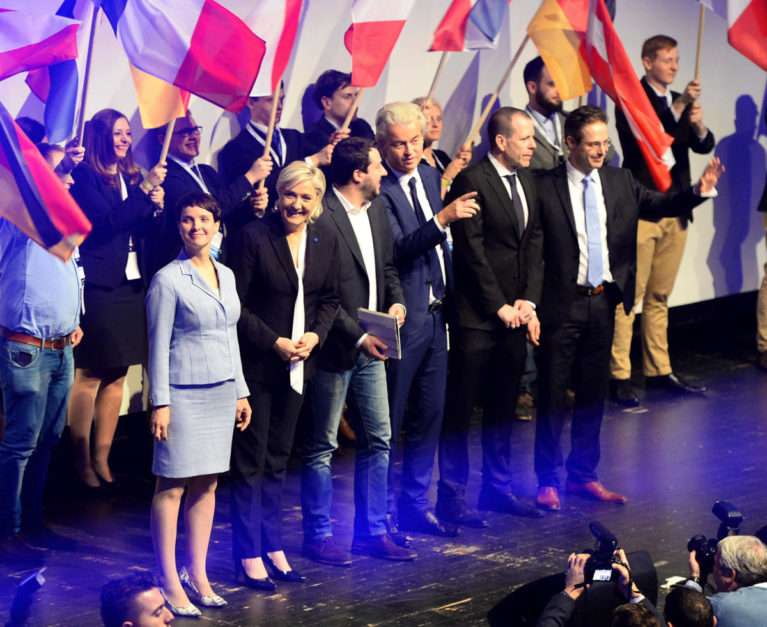European Right Wing Populism in 2017

In his 1992 book The End of History and the Last Man, Francis Fukuyama predicted that the collapse of the Soviet Union and the blatant failure of the Communist model would lead to liberal democracy and the free market becoming the default way states organised, as epitomised by the USA.
A quarter of a century later Donald Trump has taken the White House on a platform of attacking the free market, questioning the merits of American democracy (refusing to accept the election as legitimate before he won it) and questioning the value of Americaâs alliances around the world. He is just one piece of a right-wing populism spreading in the West.
Populism is hard to define because it depends on appealing to what âthe peopleâ want, and this varies depending on who âthe peopleâ are. Cas Mudde of the University of Georgia described it as framing the political debate as populists and people versus the corrupted elite. After this binary is established, it is built up depending on local context. The Economist contrasts as an example, Polish Jaroslaw Kaczynski, a Catholic populist, to Dutch Geert Wildersâ secular, anti-Islamic flavour of populism. The Leave campaign challenged the Brussels elite and the much maligned âexpertsâ naysaying Brexit. Trump promised simply to âdrain the swampâ, offering to remove the Washington insiders. From his inauguration speech: âthe establishment protected itself, but not the citizens of our country.â
After the unpredicted populist successes of Trump, the Brexit vote and the narrow defeat of extreme right wing candidate Norbert Hofer in the Austrian presidential elections in 2016, we should pay close attention to the populists running this year in France, the Netherlands and Germany.
France
The National Front (FN) in France has come close to power once before. In 2002, driven by anti-establishment anger, the French electorate allowed Jean-Marie Le Pen, the Holocaust dismissing leader of the FN to challenge Jacques Chirac for the presidency, rather than the expected Socialist Prime Minister Jospin. The run-off election was described as the choice between âthe crook and the Naziâ. Chirac won. In 2017 the outcome is more in doubt.
Once again the establishment is on the run in France. President Francois Hollande and former President Nicolas Sarkozy are both out of the race. Marine Le Pen, the charismatic leader of the newly sanitised FN (she expelled her father Jean-Marie from the party for his anti semitism) looks likely to make it to the second round against the Republican candidate. She is building a broad nationalist platform with a focus on French independence: increasing control of Franceâs borders following the 2016 migrant crisis, arguing for the protection of French industry and pushing for greater social protection for the French, with French nationals receiving support before non-French. Her full manifesto will be released in February but we can already see her presenting herself as the protector of the people of France from the outsider and the elite.
The Netherlands
The Dutch election is taking place in the middle of March, and Geert Wildersâ Freedom Party is in the lead. Wilders, recently on trial for stating the Netherlands should have fewer Moroccans, is campaigning on a similar platform to Le Pen. If Wildersâ party takes largest share of the vote it would still be a minority. He would struggle to form a governing coalition given most of his political rivals are reluctant to work with the Freedom Party. This might, in the short-term, be beneficial for the Netherlands but it would also empower Wilders. As a populist, what better evidence of a corrupt inside cabal challenging the will of the people than by refusing to support his democratic mandate?
Germany
The Germans go to the polls in late September. Angela Merkel, viewed by many as the leader of global liberalism following Trumpâs inauguration, is standing for her fourth term. Also running is Frauke Petry, leader of Alternative für Deutschland (AfD). Petry, like Le Pen, is trying to sanitise her partyâs image, arguing Germany should take in ârealâ refugees (as distinct from economic migrants). Like Le Pen, she has ousted figures considered damaging to the party image, for example Björn Höcke, removed for giving lectures on âAfricansâ reproductive habitsâ.
AfD has done well in a series of regional elections against Merkelâs Christian Democrats and are currently predicted to take 16% of the vote in September, clearing the 5% vote share needed to take seats in the Bundestag which has tripped other small and radical parties. As with Wildersâ Freedom Party, the AfD may struggle to find coalition partners.
The German election has been in the news recently after a document was leaked from the German intelligence services warning of Russian disinformation intended to affect the electionâs outcome. If this is the case, it is likely the AfD would benefit given its affinity for Russia.
Outcome
If 2017 ends with Le Pen in the presidential palace, Wilders with a majority and Petryâs star ascending, an unstable 2018 in Europe would seem likely. Petry and Le Pen have both publicly praised Putin. Le Penâs party has received funding from a Russian bank with ties to the Kremlin while Petryâs partner Pretzell, another AfD politician, has argued for the lifting of sanctions against Russia and a closer relationship with Putinâs United Russia party. In the Netherlands Putin is less popular following the 2013 downing of flight MH370, carrying many Dutch citizens, but Wildersâ call for a Dutch exit from the European Union would weaken Europeâs ability to provide a united front against the Kremlin.
Furthermore electoral success for these three parties would drive other parties to the right, compounding these developments. Where the people go the leaders follow. Take, for example, the Dutch presidentâs new hard line on integration, clearly aimed to compete with Wildersâ rhetoric. This would have dire consequences for the European project, which in turn would have several knock-on effects. The southern economies in the EU would suffer, as would the deal struck between the European Union and Turkey which is currently controlling the flow of immigrants from Syria and Iraq.
Before we despair we should consider that we are discussing mature countries with enduring commitments to democracy and equal rights, with much in common with and much to gain from their neighbours. Furthermore, for all populistsâ claims to represent the will of the people we are still talking about minorities, though sometimes large ones. Most people will not vote for Le Pen, Wilders or Petry, and Franceâs second-round system and the German and Dutch need for coalition building both serve as a check on radical change, for good and ill. Furthermore, though an international trend populism remains a phenomenon on the national level: Petryâs libertarian economics clash with Le Penâs protectionist instincts, for example. The French, Dutch and German populists are not united and ready to join the British and American ones. They are all divided based on what âtheir peopleâ want. The populists are on the march but they still have a long way to go to make themselves truly popular either domestically or internationally.
Report written by Brendan Clifford
